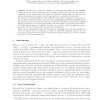17 search results - page 2 / 4 » tcc 2004 |
129
Voted
TCC
2004
Springer
15 years 6 months ago
2004
Springer
We explore the notion of a pseudo-free group, first introduced by Hohenberger [Hoh03], and provide an alternative stronger definition. We show that if Z∗ n is a pseudo-free abe...
106
Voted
TCC
2004
Springer
15 years 6 months ago
2004
Springer
Abstract. We consider compositional properties of reactive systems that are secure in a cryptographic sense. We follow the well-known simulatability approach of modern cryptography...
116
click to vote
TCC
2004
Springer
15 years 6 months ago
2004
Springer
Quantum 2-party cryptography differs from its classical counterpart in at least one important way: Given blak-box access to a perfect commitment scheme there exists a secure 1−2...
117
Voted
TCC
2004
Springer
15 years 6 months ago
2004
Springer
Abstract. We present a general method to prove security properties of cryptographic protocols against active adversaries, when the messages exchanged by the honest parties are arbi...
TCC
2004
Springer
15 years 6 months ago
2004
Springer
We show how to public-key obfuscate two commonly used shuffles: decryption shuffles which permute and decrypt ciphertexts, and re-encryption shuffles which permute and re-encrypt c...

